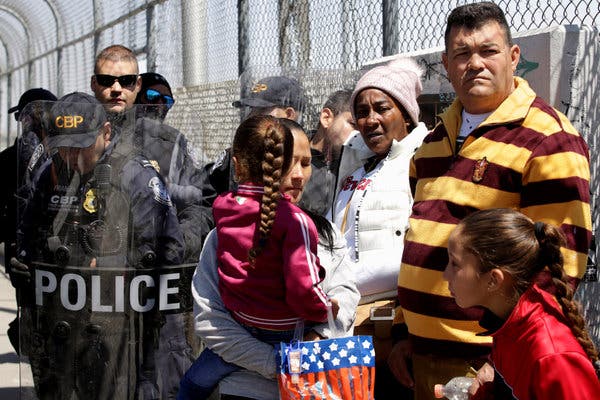
Democratic presidential contenders have shown admirable support for immigrants, who have been routinely and cruelly targeted by the present administration. Perhaps nothing demonstrated this support more than a moment back in June, when during the second night of the first round of Democratic debates, all ten candidates on the stage raised their hands when the moderator asked whether their plans would provide health care covering for undocumented immigrants (even as the reality of their positions was much more diverse than the show of unity suggested).
Whatever the politics may be of this position in a general election, it was a moment that the candidates, and the advocates that have spurred candidates to take this position, should be proud of. Immigrants, regardless of legal status, are fully entitled to the right to health, without discrimination. To have not raised their hands for undocumented immigrants would have been to raise the red flag of discrimination. When raising their hands for undocumented immigrants, the candidates raised their hands for human rights – something that all Americans should be proud of.
Here is something else Democratic candidates should plan to do on behalf of immigrants and human rights should they secure the nomination and be elected to serve as the 46th president of the United States – though publicizing this plan may not be a winning strategy. The next president should endeavor to remedy the present violation of the rights of the untold thousands of asylum seekers in the United States – and to the extent possible, untold numbers of would-be asylum seekers who never got to present their case – who have been and are continuing to be denied a genuine chance to apply for asylum in the United States.
This would include a large – if not the vast – majority of asylum seekers, such as those whose claims were denied (perhaps because of lack of legal representation or misguided standards rather than lack of merit of their claim), as nearly two-thirds were in 2018, including 80% from Honduras, Guatemala, and El Salvador (the Northern Triangle), or who never even got before a judge. It would include those who had to seek asylum from detention facilities, where the obstacles to a fair asylum hearing are immense. It would include, to the extent they can be located, the asylum seekers who left Guatemala, El Salvador, or Honduras – or elsewhere – but never made it to the United States, perhaps stopped by authorities in Mexico or Guatemala itself. This effort could even extend beyond asylum seekers to all immigrants in the United States who have been torn from their families and communities, from the country they had come to call home – some, including from Cambodia, here legally – and deported.
Determining who would-be and should-be members of the American (U.S.) family are will not be an easy undertaking, requiring examining records, cooperation with our Southern neighbors, and perhaps a petition process by people who were removed or denied entry in the first place. When identified, an appropriate remedy might be monetary compensation for the harm caused and an invitation to try again, with immediate facilitated travel (such as a U.S.-government paid flight) to avoid the dangers of the journey and to remove people from the dangers in their home countries that are leading them to seek asylum, along with guaranteed legal representation and economic support.
Better still, Congress would pass and the new President would sign legislation that created a special class of visas that would be available to all those whom government records determined entered or sought to enter, or who could otherwise demonstrate that they entered or sought to enter, the United States from January 2017 through January 2021 and were fleeing prosecution – or generalized violence, poverty, or environmental degradation, for these should be grounds of refuge too. It would put them on a path to citizenship. Indeed, the applicable timeframe could pre-date January 2017, for when were our immigration policies truly humane and asylum system well-functioning?
This would be coupled by a more systemic response, recognizing that the best efforts to identify people the United States has wronged will miss many people, and because the best solution to people fleeing violence and poverty is stemming that violence and reducing that poverty. This effort could have two main components. One would be to shore up our asylum system to prevent future wrongs, from clarifying expanded grounds for asylum (such as writing into law that dangers such as gang and domestic violence are grounds for asylum) to ensuring against detention and guaranteeing legal representation. Second, it would include a “Marshall Plan” for the Northern Triangle, an idea around for at least several years now and one that candidates have proposed. This should address the poverty and violence, as well as the misgovernance that are the true root causes, such as corruption and weak judicial systems.
While the structural components of this response, particularly the “Marshall Plan,” may garner significant public support, I have serious doubts that the individual redress would. But it is the right thing. Human rights violations require remedies. Serious violations demand serious remedies. Sending people back to risk of great harm and death are serious violations of their rights. We need to be serious about the remedies. That will help restore the light to the torch of liberty.



